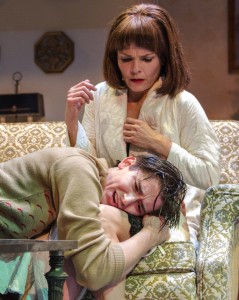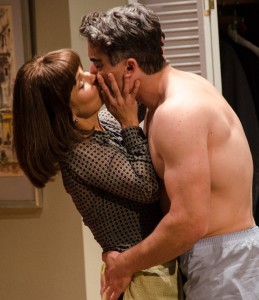TACT’s revival of William Inge’s 1963 play Natural Affection is the first since the Broadway premiere. Though the drama flopped (perhaps partly attributable to the 1962 newspaper strike that killed off the New York Daily Mirror), it proves much sturdier 50 years later than one might expect.
In the lecture collection Stella Adler on America’s Master Playwrights, the renowned acting teacher declares, “Inge loves women for their helplessness, their tenderness, their ability to raise families, their goodness of heart to the people they’re involved with. He’s very much a woman-protective writer.” One virtue of TACT’s production, strongly cast as usual, is that whatever tenderness and helplessness Adler was thinking of during her lecture, Inge has moved on.
In Natural Affection, Inge tackles the hot topics that simmered just before civil rights eruptions took over as No. 1: working women; unmarried couples living together; repressed homosexuality; and disaffected youth, then known as juvenile delinquents. And although the characters talk about Tennessee Williams’s Sweet Bird of Youth for comic effect, the playwright takes a cue from it. Natural Affection has plot elements as lurid as anything in Williams.
Director Jenn Thompson introduces a saxophone playing jazz music periodically to underscore the hothouse atmosphere, where sexual attitudes are more open and casual than the repressed yearnings in Inge's Pulitzer Prize–winning Picnic. Kathryn Erbe’s level-headed Sue Barker, the female protagonist, lives unmarried with Bernie Slovenk, a car salesman (Alec Beard). She’s a successful buyer of women’s lingerie at a department story, but Bernie is having a tough time at his job selling cars, and he chafes at Sue’s income, which is greater than his. Though she longs for marriage, he balks at any union until he can be the breadwinner.
The urban setting, Chicago, is also unusual for Inge. Sue and Bernie live in a comfortable, modern and slightly tacky apartment building (designed by John McDermott with stripes on the hallway walls that suggest a prison). The equilibrium is upset when Sue’s son Donnie (Chris Bert), born out of wedlock, is scheduled to visit for Christmas. When she had Donnie at 18, Sue placed him in an orphanage. When she got him out, he fell in with the wrong crowd. After stealing a car and beating a woman, he was sentenced to reform school. Now Sue wants to give him a taste of family love during his Christmas visit, but she doesn’t realize that Donnie has permission to stay out on parole if she’ll agree to look after him during the last year of his sentence.
Two neighbors, Vince and Claire Brinkman, complicate the relationships: Bernie has had a few flings with would-be model Claire (a ravishing, petulant Victoria Mack); Vince (John Pankow) cannot satisfy her sexually and is a heavy drinker. Inge suggests also that Vince may be a repressed homosexual with a yen for Bernie. Beard as Bernie does a nice job of finding affection and disillusion in the character, chafing at the failure of his ambitions, struggling to be faithful to Sue and finding himself at sea. To Inge’s credit, neither Bernie nor Sue is perfect, and Erbe balances Sue’s guilt and confidence, and her obligations to lover and son — until Inge introduces a character revelation that’s hard to swallow.
By that time, though, the play has veered into overheated melodrama. One can almost feel the story go off the rails when Vince goes on a drunken tirade against everything modern: television, movies, abstract paintings and brutalist buildings. Pankow does the bravura moment full justice, but it sounds as if it’s the author’s philippic, and the play's last act, with twists and violence, moves into potboiler territory. (Inge’s title is double-edged because “natural” can mean something good and appropriate, or, in describing a child like Donnie, illegitimate; the opposite meanings apply to different relationships in the play.)
Thompson's direction is mostly solid, although an early, brief scene with Donnie and Gil, a fellow inmate on leave, doesn't work. Gil should be a menacing presence, but Tobi Aremu is too well-scrubbed and casual; only the subject matter — Gil’s sounding out Donnie about whether he could kill people — suggests he’s dangerous. Thompson interpolates a moment when the fleeing Gil grabs a knickknack and pockets it, but the petty theft is almost laughable as a marker of criminality. (And, unfortunately, the move primes an audience for someone to comment on the missing item, but it doesn’t happen.) Nonetheless, her production demonstrates that this unfamiliar Inge play has much more food for thought than the term “flop” would suggest.



